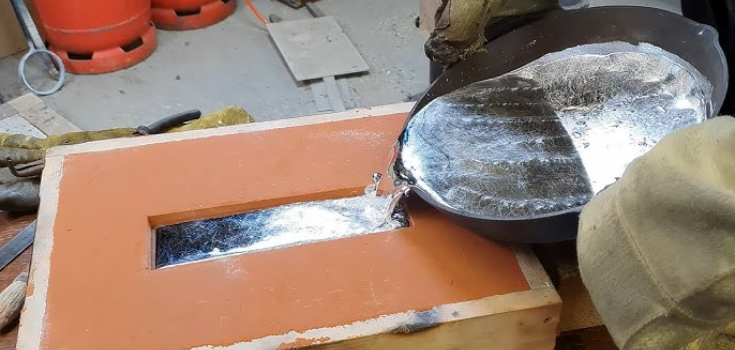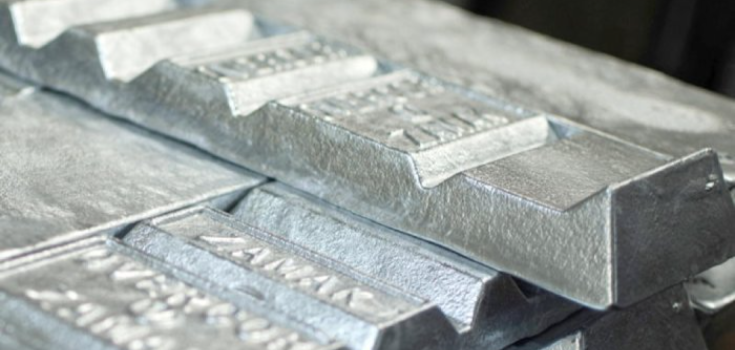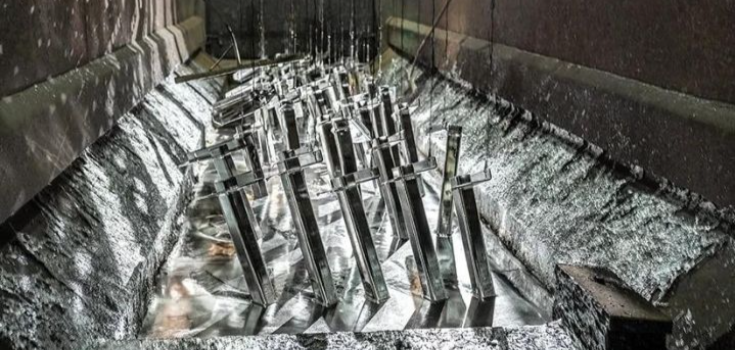- Startseite
- Blog
- Zinc Density: Everything You Need to Know
Zinc Density: Alles, was Sie wissen müssen
Zinc is a common material used in many industries. One important property to understand when working with zinc is its density, as it can affect how it’s used in different projects.
Let me help you make better decisions as I will discuss useful information about zinc density, how to calculate it, some applications, and much more.
What is Zinc Density?
Zinc density is the mass of zinc for each unit of volume. Pure zinc has a density of about 7140 kg/m³ at room temperature (around 25°C). This means one cubic meter of zinc weighs 7140 kilograms. However, zinc density can change depending on temperature, impurities, or if it’s mixed with other metals.
Zinc Density Chart
Below are the different units of Zinc Density:
| Units of Density | Wert |
| kg/L | 7.14 |
| g/mL | 7.14 |
| g/cm³ | 7 |
| t/m³ | 7.14 |
| oz/cu in (Avoirdupois ounce per cubic inch) | 4 |
| oz/US fl oz (Avoirdupois ounce per fluid ounce | 7.4431 |
| lb/cu in (Avoirdupois pound per cubic inch) | 0.2578 |
| lb/cu ft (pound per cubic foot) | 445.4235 |
| lb/cu yd (pound per cubic yard) | 12026.4342 |
| lb/US gal (pound per US liquid gallon) | 59.5445 |
Comparing Molten Zinc Density to Zinc Dust Density
Zinc’s density changes depending on whether it’s in solid, molten, or powdered form. These differences matter when you’re choosing the right form of zinc for your project. Let’s look at how they compare:
Molten Zinc Density

When Zink melts at temperatures above 419°C, its density becomes a bit lower than when it’s solid. At around 450°C, molten zinc has a density of about 6570 kg/m³. This happens because the atoms in liquid zinc are less packed together than in solid zinc.
Knowing this is important, especially when you use molten zinc for coating steel (galvanization), as the coating thickness depends on the density.
Zinc Dust Density
Zinc dust, or the powdered form, has a much lower density because of the air between the powder particles. The density of zinc dust is usually between 3500-4500 kg/m³, depending on the particle size and how compact the powder is. This information helps manufacturers figure out the best way to transport and store zinc dust.
Exploring Zinc Alloy Density and Compounds
Zinc works well with other metals, which is why it’s often used in alloys to improve certain properties for specific industrial uses. The density of zinc alloys can vary compared to pure zinc.
Zink-Legierungen

Zamak: This alloy contains mostly zinc and aluminum, with a density between 6600-6800 kg/m³. It’s strong and has great mechanical properties, which is why it is ideal for Druckguss.
Messing: Brass is a mix of zinc and copper, and its density ranges from 8300-8700 kg/m³, depending on the ratio of the two metals. It’s strong, corrosion-resistant, and used for electrical connectors, plumbing, and decorative items.
Zinc Compounds
Zinc combines with other elements to form compounds that have unique densities. Here are a couple of examples:
Zinc Oxide (ZnO): With a density of about 5606 kg/m³, zinc oxide is used in rubber production, cosmetics, and many other products.
Zinc Sulfide (ZnS): This compound has a lower density of around 4090 kg/m³ and is often used in optical materials and pigments.
How to Calculate Zinc Density

To find the density of zinc, you can use a simple formula:
Density = Mass ÷ Volume
First, you measure the mass of the zinc using a weighing scale (in kilograms). Then, you find the volume by multiplying the length, width, and height:
Volume = Length x Width x Height
If you are working with molten zinc, you need to be careful. When zinc is heated, it expands, and when it cools down, it shrinks. So, you must think about the Temperatur when you calculate the density of molten zinc.
Factors Affecting Density of Zinc
As mentioned earlier, the density of zinc can change. Several factors can affect the density of zinc, and some of them are the following:
Temperatur: Zinc’s density decreases as the temperature increases. When zinc is heated and becomes molten, the molecules spread out, which makes the density lower. When the temperature drops, the molecules come closer together, increasing the density.
Zusammensetzung der Legierung: When zinc is mixed with other metals, the density changes depending on the composition. For example, adding aluminum to zinc to make Zamak lowers the density compared to pure zinc.
Impurities: Impurities in zinc reduce its density. Pure zinc has a high density, but if it contains other materials, the density will depend on the type and amount of impurities.
Physical Form: The density of zinc changes depending on its form. Zinc powder has a lower bulk density than solid zinc because there are air gaps between the particles in the powder.
Applications of Zinc Based on Density
Here are some common applications based on its density:
Verzinkung

Molten zinc, which has a lower density than solid zinc, is used for coating steel in a process called galvanization. The lower density helps the zinc flow and coat the steel evenly, providing corrosion protection.
Druckgießen
Zinc alloys, like Zamak, are used in die casting for making parts like automotive components. Their density makes them strong and durable while remaining lightweight.
Batterien
Zinc’s density plays a role in battery technology, especially in alkaline and zinc-carbon batteries. The density helps determine how much power the battery can store and how long it will last.
Coating and Paints
Zinc oxide, with its unique density, is used in coatings and paints for its protective properties. Its density makes it effective in preventing rust and corrosion.
Storage and Transport
Zinc dust’s lower density is useful for applications where bulk and weight are concerns. For example, manufacturers consider zinc dust’s density when deciding how to store or transport it efficiently.
Schlussfolgerung
If you want to use zinc in your business, it’s important to understand its density. This will help you make the most of the metal by improving efficiency, lowering fabrication costs, and boosting the quality of your products.
Let DEK help you make zinc work better for you. Kontakt today to learn more.
FAQs
Why is zinc sulfate density important in industrial applications?
The density of zinc sulfate matters because it affects how the material behaves in different processes. Knowing its density helps you use it more efficiently, ensuring better results in production and saving on costs.
Does zinc-plated steel density change with the coating thickness?
Yes, the density of zinc-plated steel can change with the thickness of the zinc coating. Thicker coatings will add more weight, which can affect the overall density of the steel.
Can molten zinc density vary with impurities?
Yes, the density of molten zinc can change if there are impurities. These impurities can affect how zinc flows and its overall density during the melting process.
Is the liquid zinc density affected by temperature?
Yes, the density of liquid zinc is affected by temperature. As the temperature increases, the density of liquid zinc usually decreases, meaning it becomes less dense as it gets hotter.
